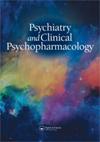应用多感觉刺激干预治疗重大神经认知障碍
IF 0.5
4区 医学
Q4 PHARMACOLOGY & PHARMACY
引用次数: 8
摘要
目的:痴呆症的行为和心理症状(BPSD)是一种异质性的非认知症状和行为,可引起显著的患者痛苦,并提出复杂的管理挑战。行为和药物治疗用于减轻症状,保持功能和提高生活质量。在治疗患有严重神经认知障碍的个体时,非药物干预通常是首选的一线治疗方法,而不是药物干预,后者通常疗效一般,副作用明显,风险很大。多感觉刺激(MSS)干预在BPSD的治疗中越来越受欢迎,特别是在疾病进展时。这篇综述的目的是简要概述目前用于治疗主要神经认知障碍的MSS干预措施的类型。方法:使用PubMed和Web of Science Core Collection检索该领域发表的论文。这些搜索是在过去的20年里完成的,关键词是“治疗BPSD的多感觉刺激”,“治疗主要认知障碍的多感觉刺激”,“治疗痴呆的多感觉刺激”和“治疗神经退行性疾病的多感觉刺激”。结果:讨论了多感觉环境、多感觉工具和多感觉群体治疗。越来越多的人支持使用MSS干预措施来改善老年痴呆症和BPSD患者的情绪、行为和生活质量。然而,目前这些干预措施的使用是高度可变的,其使用的有力证据是有限的。结论:多感觉环境、工具和群体治疗形式的MSS干预在治疗重大神经认知障碍的一线治疗或辅助药物干预方面具有巨大的潜力。然而,目前存在的高质量证据是有限的。缺乏证据并不一定意味着缺乏疗效,迫切需要加强研究力度和研究设计,以确定特定的MSS干预措施的有效性,并确定这些干预措施可能对哪些人最有益。本文章由计算机程序翻译,如有差异,请以英文原文为准。
Use of multisensory stimulation interventions in the treatment of major neurocognitive disorders
ABSTRACT OBJECTIVE: Behavioral and psychological symptoms of dementia (BPSD) are a heterogeneous constellation of non-cognitive symptoms and behaviours that can cause significant patient distress and present complex management challenges. Behavioural and pharmacological treatments are used to decrease the symptoms, preserve function and increase quality of life. In the treatment of individuals with a major neurocognitive disorder, non-pharmacological interventions are often preferred as first-line treatment over pharmacological interventions, which often have modest efficacy, notable side effects and significant risks. Multisensory stimulation (MSS) interventions have become increasingly popular in the treatment of BPSD, particularly with disease progression. The objective of this review paper is to provide a brief overview of the types of MSS interventions currently used in the treatment of major neurocognitive disorders. METHODS: Searches for papers published in this area were conducted using PubMed and the Web of Science Core Collection. The searches were done for the period covering the past 20 years, and key phrases used were “multisensory stimulation for treatment of BPSD,” “multisensory stimulation for treatment of major cognitive disorders,” “multisensory stimulation for treatment of dementia” and “multisensory stimulation for treatment of neurodegenerative disorders.” RESULTS: Multisensory environments, multisensory tools and multisensory group therapies are discussed. There is growing support for the use of MSS interventions to improve mood, behaviour and quality of life in seniors with dementia and BPSD. However, currently the utilization of these interventions is highly variable and strong evidence for their use is limited. CONCLUSION: MSS interventions in the form of multisensory environments, tools and group therapies present tremendous potential as first-line treatments or as adjuncts to pharmacological interventions in the treatment of major neurocognitive disorders. However, the body of quality evidence that currently exists is limited. A lack of evidence does not necessarily mean a lack of efficacy, and there is a pressing need for studies with improved power and study design to determine the effectiveness of specific MSS interventions and to ascertain for whom they may be most beneficial.
求助全文
通过发布文献求助,成功后即可免费获取论文全文。
去求助
来源期刊

Psychiatry and Clinical Psychopharmacology
Medicine-Psychiatry and Mental Health
CiteScore
1.00
自引率
14.30%
发文量
0
期刊介绍:
Psychiatry and Clinical Psychopharmacology aims to reach a national and international audience and will accept submissions from authors worldwide. It gives high priority to original studies of interest to clinicians and scientists in applied and basic neurosciences and related disciplines. Psychiatry and Clinical Psychopharmacology publishes high quality research targeted to specialists, residents and scientists in psychiatry, psychology, neurology, pharmacology, molecular biology, genetics, physiology, neurochemistry, and related sciences.
 求助内容:
求助内容: 应助结果提醒方式:
应助结果提醒方式:


